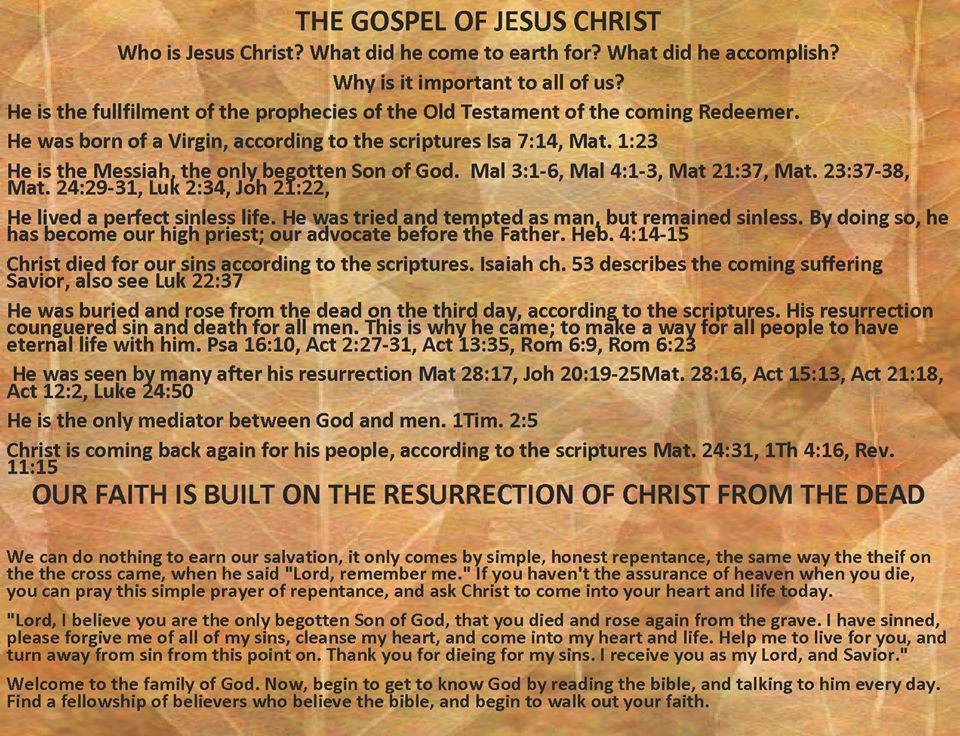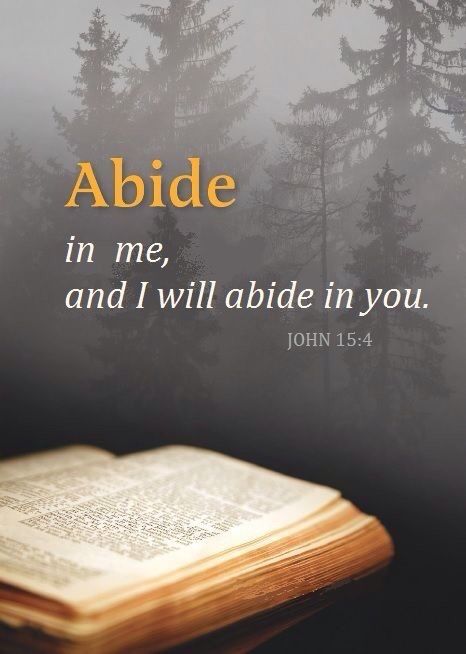Rom 3:23 For all have sinned, and come short of the glory of God;
This one verse sums up the condition of every man, woman and child born in the earth. But, many do not know it is even in the Bible, and do not realize it defines them personally.
In God's eyes, we all stand as sinners, in need of a Savior. Many will not accept this, but our denial doesn't change the truth.
If we lie once, it makes us a sinner. If I've stolen even one thing, I've transgressed God's laws, and it makes me a sinner. If you look at a woman/man with lust in your heart-in God's eyes, you've committed adultery. The world today is saturated with idolatry, various forms of covetousness, and rampant with jealousies, competitions and envy.
James tells us, if we've committed one sin, we've become guilty of them all:
Jas 2:10 For whosoever shall keep the whole law, and yet offend in one point, he is guilty of all.
These verses teaches us, if you break any one of them, you sin against the Divine Lawgiver. It causes us to realize it is impossible for us to keep God's laws, just as the Jews could not keep the laws in Israel; it is impossible.
This is a “hard saying”—not because it's hard to understand,” but because it is very easy to be understood. It is very plain and simple; it tells us clearly that if anyone should keep the whole law of God, except one point, he would just as much be an offender against the law, as if he had broken the whole. The saying is hard, only because it is contrary to our notions. We cannot bear that so much responsibility is placed on our single actions. We naturally want to measure ourselves by an easy, pliant rule, making large allowances for ourselves: we shrink from looking into our actions, one by one, which exposes our lawlessness. It tells us that God looks upon us and our actions one by one; that we cannot be two sorts of selves, one a transgressor, the other a doer of the law; that He does not give His commandments to be dealt with in a trifling way; that He seeks at our hands a full unswerving obedience.
What is the answer to our plight? Let's go back and re-read Romans 3:23, with the verses above, and under it-in context:
Rom 3:22 Even the righteousness of God which is by faith of Jesus Christ unto all and upon all them that believe: for there is no difference:
Rom 3:23 For all have sinned, and come short of the glory of God;
Rom 3:24 Being justified freely by his grace through the redemption that is in Christ Jesus:
What now, do these verses teach us?...
In God's eyes, we all stand as sinners, in need of a Savior. Many will not accept this, but our denial doesn't change the truth.
If we lie once, it makes us a sinner. If I've stolen even one thing, I've transgressed God's laws, and it makes me a sinner. If you look at a woman/man with lust in your heart-in God's eyes, you've committed adultery. The world today is saturated with idolatry, various forms of covetousness, and rampant with jealousies, competitions and envy.
James tells us, if we've committed one sin, we've become guilty of them all:
Jas 2:10 For whosoever shall keep the whole law, and yet offend in one point, he is guilty of all.
These verses teaches us, if you break any one of them, you sin against the Divine Lawgiver. It causes us to realize it is impossible for us to keep God's laws, just as the Jews could not keep the laws in Israel; it is impossible.
This is a “hard saying”—not because it's hard to understand,” but because it is very easy to be understood. It is very plain and simple; it tells us clearly that if anyone should keep the whole law of God, except one point, he would just as much be an offender against the law, as if he had broken the whole. The saying is hard, only because it is contrary to our notions. We cannot bear that so much responsibility is placed on our single actions. We naturally want to measure ourselves by an easy, pliant rule, making large allowances for ourselves: we shrink from looking into our actions, one by one, which exposes our lawlessness. It tells us that God looks upon us and our actions one by one; that we cannot be two sorts of selves, one a transgressor, the other a doer of the law; that He does not give His commandments to be dealt with in a trifling way; that He seeks at our hands a full unswerving obedience.
What is the answer to our plight? Let's go back and re-read Romans 3:23, with the verses above, and under it-in context:
Rom 3:22 Even the righteousness of God which is by faith of Jesus Christ unto all and upon all them that believe: for there is no difference:
Rom 3:23 For all have sinned, and come short of the glory of God;
Rom 3:24 Being justified freely by his grace through the redemption that is in Christ Jesus:
What now, do these verses teach us?...
The Righteousness of God Through Faith
Therefore, by the deeds of the law shall no flesh be justified. Since all are found to be sinners, law-breakers, none can be counted sinless; or, in other words, justified.
Works of the law. In the Greek, this reads, Works of law. The statement is general, and of course would include the law of Moses.
For by the law is the knowledge of sin. Again the article is not found in the Greek before law. Law, generally, when once known, reveals to us that we are transgressors. The savage steals as a legitimate pursuit, but when once he hears the law, "Thou shalt not steal," his sin is revealed.
The righteousness of God without the law (Greek, without law) is manifested. A righteousness that does not spring from perfect obedience to law (without law), is predicted both by the law of Moses and the prophets of Israel.
Even the righteousness . . . by faith of Jesus Christ. The Gospel, wherein we are "justified by faith, and have peace with God through Jesus Christ." All were guilty under the law, but the law and prophets pointed to forgiveness in Christ.
Unto all them that believe. There is justification for every sincere believer, whether Jew or Gentile, for there is no difference between them, but not for the unbelieving impenitent.
For all have sinned. This has been already shown.
And come short of the glory of God. Wickliffe says, "Have need of the glory of God." I believe this suggests the idea. Man was made originally in the image of God. He was then sinless. No sinner is in the Divine image. All have sinned, and to have the divine likeness restored, need to have their sins blotted out. Until this is done they come short of the glory of God.
Being justified freely by his grace. All who believe upon Jesus Christ have their sins thus blotted out, being freely, as a divine gift, justified (that is, counted just, or sinless) by grace, through the redemption that is in Christ Jesus. Christ redeems the sinner who puts his trust in him. His blood pays the debt that the sinner owes to justice. Since Christ, the sinless One, has suffered for sin, God will accept his suffering for the debt of those who love and trust in him.
Whom God hath set forth to be a propitiation. Christ was publicly shown forth as a MERCY SEAT (a Propitiatory). As God of old met Israel at the mercy seat when the blood of the atonement was offered, so Christ on the Cross is our mercy seat. There we meet God who comes to us then in tender mercy, to declare his righteousness, to show it to us, in bestowing righteousness upon us in forgiving our past sins. This system of forgiveness, or righteousness through the cross of Christ, is the righteousness without law predicted by the Law and the Prophets.
That he might be just. Can God be just, and yet justify the sinner? Only, because justice was fully satisfied when the sinless Christ died, not for himself, but for his people. The believer in Christ Jesus, trusting in him, baptized into Christ, into his death, is in Christ, and Christ hath paid the penalty for all who are found in him.
In summary, all who have placed their faith and trust in Christ Jesus, and have had their sins blotted out by that faith can stand on Romans ch. 8:1-
Rom 8:1 There is therefore now no condemnation to them which are in Christ Jesus, who walk not after the flesh, but after the Spirit.
Rom 8:2 For the law of the Spirit of life in Christ Jesus hath made me free from the law of sin and death.
As a believer in Christ, we seek to walk in obedience to Jesus, out of love, not obligation. We seek to walk after the Spirit, and forsake the life of the flesh. The Holy Spirit in us, aids and assists us in walking in righteousness, but, if we stumble and fall, we do not lose heart. The remedy is given to us in 1John 1:8-10
1Jn 1:8 If we say that we have no sin, we deceive ourselves, and the truth is not in us.
1Jn 1:9 If we confess our sins, he is faithful and just to forgive us our sins, and to cleanse us from all unrighteousness.
1Jn 1:10 If we say that we have not sinned, we make him a liar, and his word is not in us.
Jesus has made a provided for us a way to walk out this life, and stay in the narrow path, with his word as a light for the journey.
Lorna Couillard
Works of the law. In the Greek, this reads, Works of law. The statement is general, and of course would include the law of Moses.
For by the law is the knowledge of sin. Again the article is not found in the Greek before law. Law, generally, when once known, reveals to us that we are transgressors. The savage steals as a legitimate pursuit, but when once he hears the law, "Thou shalt not steal," his sin is revealed.
The righteousness of God without the law (Greek, without law) is manifested. A righteousness that does not spring from perfect obedience to law (without law), is predicted both by the law of Moses and the prophets of Israel.
Even the righteousness . . . by faith of Jesus Christ. The Gospel, wherein we are "justified by faith, and have peace with God through Jesus Christ." All were guilty under the law, but the law and prophets pointed to forgiveness in Christ.
Unto all them that believe. There is justification for every sincere believer, whether Jew or Gentile, for there is no difference between them, but not for the unbelieving impenitent.
For all have sinned. This has been already shown.
And come short of the glory of God. Wickliffe says, "Have need of the glory of God." I believe this suggests the idea. Man was made originally in the image of God. He was then sinless. No sinner is in the Divine image. All have sinned, and to have the divine likeness restored, need to have their sins blotted out. Until this is done they come short of the glory of God.
Being justified freely by his grace. All who believe upon Jesus Christ have their sins thus blotted out, being freely, as a divine gift, justified (that is, counted just, or sinless) by grace, through the redemption that is in Christ Jesus. Christ redeems the sinner who puts his trust in him. His blood pays the debt that the sinner owes to justice. Since Christ, the sinless One, has suffered for sin, God will accept his suffering for the debt of those who love and trust in him.
Whom God hath set forth to be a propitiation. Christ was publicly shown forth as a MERCY SEAT (a Propitiatory). As God of old met Israel at the mercy seat when the blood of the atonement was offered, so Christ on the Cross is our mercy seat. There we meet God who comes to us then in tender mercy, to declare his righteousness, to show it to us, in bestowing righteousness upon us in forgiving our past sins. This system of forgiveness, or righteousness through the cross of Christ, is the righteousness without law predicted by the Law and the Prophets.
That he might be just. Can God be just, and yet justify the sinner? Only, because justice was fully satisfied when the sinless Christ died, not for himself, but for his people. The believer in Christ Jesus, trusting in him, baptized into Christ, into his death, is in Christ, and Christ hath paid the penalty for all who are found in him.
In summary, all who have placed their faith and trust in Christ Jesus, and have had their sins blotted out by that faith can stand on Romans ch. 8:1-
Rom 8:1 There is therefore now no condemnation to them which are in Christ Jesus, who walk not after the flesh, but after the Spirit.
Rom 8:2 For the law of the Spirit of life in Christ Jesus hath made me free from the law of sin and death.
As a believer in Christ, we seek to walk in obedience to Jesus, out of love, not obligation. We seek to walk after the Spirit, and forsake the life of the flesh. The Holy Spirit in us, aids and assists us in walking in righteousness, but, if we stumble and fall, we do not lose heart. The remedy is given to us in 1John 1:8-10
1Jn 1:8 If we say that we have no sin, we deceive ourselves, and the truth is not in us.
1Jn 1:9 If we confess our sins, he is faithful and just to forgive us our sins, and to cleanse us from all unrighteousness.
1Jn 1:10 If we say that we have not sinned, we make him a liar, and his word is not in us.
Jesus has made a provided for us a way to walk out this life, and stay in the narrow path, with his word as a light for the journey.
Lorna Couillard








